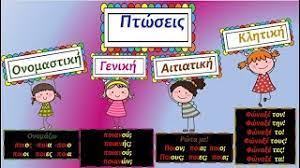Difference between revisions of "Language/Modern-greek-1453/Grammar/The-cases-in-Modern-Greek"
m (Quick edit) |
|||
| Line 27: | Line 27: | ||
* doing something to the subject | * doing something to the subject | ||
'''Ex :''' '''Ο Γιάννης''' έφυγε : John left | '''Ex :''' '''Ο Γιάννης''' έφυγε : John left | ||
| Line 39: | Line 38: | ||
A genitive often follows after the noun it qualifies. A genitive occurs with verbs, adjectives, adverbs, and prepositions. | A genitive often follows after the noun it qualifies. A genitive occurs with verbs, adjectives, adverbs, and prepositions. | ||
'''Ex :''' Το αυτοκίνητο '''του Νίκου : Niko’s''' car. | '''Ex :''' Το αυτοκίνητο '''του Νίκου : Niko’s''' car. | ||
| Line 56: | Line 54: | ||
To form this vocative it will add nothing to the stem of the noun. | To form this vocative it will add nothing to the stem of the noun. | ||
Ex : Έλα, '''Δημήτρη''' : Come on, Dimitri! | Ex : Έλα, '''Δημήτρη''' : Come on, Dimitri! | ||
| Line 66: | Line 63: | ||
{{Marianthi-Signature}} | {{Marianthi-Signature}} | ||
== | ==Other Lessons== | ||
* [[Language/Modern-greek-1453/Grammar/Adjective-and-Adverb|Adjective and Adverb]] | * [[Language/Modern-greek-1453/Grammar/Adjective-and-Adverb|Adjective and Adverb]] | ||
* [[Language/Modern-greek-1453/Grammar/Negations|Negations]] | * [[Language/Modern-greek-1453/Grammar/Negations|Negations]] | ||
| Line 77: | Line 74: | ||
* [[Language/Modern-greek-1453/Grammar/Irregular-adjectives|Irregular adjectives]] | * [[Language/Modern-greek-1453/Grammar/Irregular-adjectives|Irregular adjectives]] | ||
* [[Language/Modern-greek-1453/Grammar/Particles|Particles]] | * [[Language/Modern-greek-1453/Grammar/Particles|Particles]] | ||
<span links></span> | |||
Revision as of 22:22, 27 March 2023
The cases in Modern Greek
In Modern Greek we have to deal with the following cases :
| η ονομαστική | the nominative |
| η γενική | the genitive |
| η αιτιατική | the accusative |
| η κλητική | the vocative |
The nominative
The nominative, is designating the subject of a verb and the words that agree with it. It is the basic case denoting the declinable words in dictionaries
- the subject does or makes something
- the subject is in a particular situation
- the subject experiences something
- doing something to the subject
Ex : Ο Γιάννης έφυγε : John left
Η Πόπη έπεσε στο έδαφος : Poppy fell on the ground
The genitive
The genitive case denotes possession. A noun, pronoun, or adjective in the genitive case is often used as a possessive form or the object of a preposition.
The genitive case is used much like in the English language with words such as: “my,” “your,” “his,” “hers.”
A genitive often follows after the noun it qualifies. A genitive occurs with verbs, adjectives, adverbs, and prepositions.
Ex : Το αυτοκίνητο του Νίκου : Niko’s car.
Τα πόδια των καρεκλών : The legs of the chairs.
Accusative Case
The accusative case is the most common as it is the most general in its unaffected meaning. In both ancient and modern Greek, nouns, adjectives, verb participles, articles, and pronouns are used in the accusative case. The accusative marker used depends on gender, number, and declension.
Ex : Ο Νίκος γνωρίζει τον Κώστα : Nikos knows Costa.
Διάβαζα όλη την ημέρα : I read throughout the day.
Vocative Case
The vocative is used for one direct addresses a person or thing, such as when you are talking to someone.
To form this vocative it will add nothing to the stem of the noun.
Ex : Έλα, Δημήτρη : Come on, Dimitri!
Νίκο! : Nico!
Ιατρέ! : Docter!
Author
- Ευγενική χορηγία που στοχεύει να βοηθήσει μαθητές ή μη, απανταχού της Γης, που επιδίδονται στην εκμάθηση της ελληνικής γλώσσας!
- Contribution bénévole visant à aider les personnes, partout dans le monde, qui sont engagées dans l'apprentissage de la langue grecque !
- Voluntary contribution aimed at helping people, all over the world, who are committed to learning the Greek language!
Other Lessons
- Adjective and Adverb
- Negations
- Words written with γγ or γκ
- Negative Sentence
- The predicate
- Verbes elliptiques, impersonnels et irréguliers
- Common Mistakes in Learning Greek
- The final v
- Irregular adjectives
- Particles
